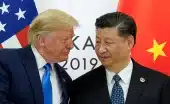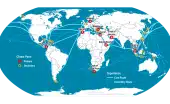Molly Minturn - My family is heartbroken to share that my father died in surgery on Monday, Feb. 10. It…
Seabeds and Outer Continental Shelf
Written by Diana Thebaud Nicholson // August 5, 2013 // Cleo Paskal, Sustainable Development, Water // Comments Off on Seabeds and Outer Continental Shelf
Seabed mining could earn Cook Islands ‘tens of billions of dollars’
Tiny nation expects stakes in companies for free in return for rights to exploit its resources, says finance minister

The Cook Islands hopes to transform itself into one of the world’s richest countries within a decade by sending robots to the sea floor to collect minerals that it believes are worth tens of billions of dollars.
Mark Brown, the Cook Islands’ finance minister, said mining the minerals on the bottom of the South Pacific could increase gross domestic product a hundredfold. “It has the potential to basically transform our economy hugely significantly with just the value of the resources sitting on the sea floor,” he told the Guardian.
Brown said there is such a supply of minerals at the bottom of the ocean surrounding the Cook Islands – an archipelago of 15 small islands between New Zealand and Hawaii – that it could transform the nation into one of the richest in the world in terms of per-capita income.
9 June 2011
Not littorally Shangri-La
The South China Sea becomes a zone of eternal dispute
(The Economist) Besides a wealth of marine life, the sea is believed to be rich in oil and gas: the “next Persian Gulf” in the words of one excited observer. The countries laying claim to this bounty have all been building up their navies, notably China which this week officially confirmed long-known plans to deploy its first aircraft-carrier. To counter such advances, Vietnam has ordered six Kilo-class submarines from Russia.
In 2002 China and the ten-member Association of South-East Asian Nations agreed to a “declaration” on a code of conduct for the sea. This is a promise to formalise a code minimising the risk that disputes between fishermen or other users of the sea might escalate into conflict. The code has not emerged. But optimists point to the restraint parties have shown since 2002 in not occupying uninhabited islands or specks of rock (though they have been energetically fortifying the places where they already had a presence). Similarly, some were cheered when China’s most recent statement of its claim did not include the contentious map, and could even be construed as accepting UNCLOS principles.
2009
7 May
Three small island states make submission for 600,000 square kilometres of seabed
Commonwealth assists Papua New Guinea, Solomon Islands and the Federated States of Micronesia
Papua New Guinea, Solomon Islands and the Federated States of Micronesia have lodged a joint submission with the United Nations to secure access to additional areas of seabed. It is the first joint submission to be made in the Pacific and the first prepared by three small island developing states anywhere in the world. Securing exclusive access and jurisdictional certainty to the potentially lucrative resources of the seabed such as oil, gas, minerals and living marine organisms is considered by many coastal states to be crucial for their future development.
Commonwealth assists Kenya to claim 102,000 sq km of additional seabed
1 May 2009
Rich nations helping former colonies with seabed claims
UNITED NATIONS — Developing countries trying to claim new undersea territory via a U.N. commission are getting assistance from former colonial overlords or other wealthier nations. The Commission on the Limits of the Continental Shelf (CLCS) — 21 geographers and hydrographers drawn from governments and the petroleum industry — has seen its workload double since late last year, with new seabed claims arriving almost every week — with most applications coming from developing countries.
February 2009
A Fair Deal on Seabed Wealth: The Promise and Pitfalls of Article 82 on the Outer Continental Shelf
Briefing Paper
Cleo Paskal and Michael Lodge
- Approximately 70 of the 156 States that have ratified the 1982 UN Convention on the Law of the Sea have potential Outer Continental Shelf Claims (OCS). Those claims could cover more than 15 million square kilometres of seabed.
- Under Article 82 of the Convention, a portion of the revenue from the extraction of non-living resources on the OCS must be disbursed ‘on the basis of equitable sharing criteria, taking into account the interests and needs of developing States, particularly the least developed and the land-locked among them.’
- Article 82 is a unique and complex provision that does not address many of the specifics of how this is to be accomplished.
- The Energy, Environment and Development Programme at Chatham House is working with the body charged with applying Article 82, the International Seabed Authority, to explore in greater detail some of the critical issues of implementation while the Article is still dormant.
16 August 2007
All eyes are on Arctic seabed resources
Gwynne Dyer
There is a scramble for the Arctic, but it is not military.
It’s about laying claim to potentially valuable resources on the basis of geographical and geological data, within the framework laid down by the United Nations Convention on Law of the Sea.
The 1982 treaty, which now has 155 member-states, sets out the rules for claiming seabed rights, which is the only issue of real economic importance to the various Arctic players. It’s all about mapping the seabed, doing the seismic work, and registering your claims within 10 years of ratifying the law of the sea treaty.



